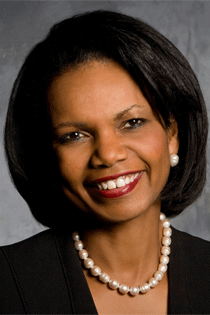By Austin Alexander
In the opening pages of No Higher Honor, Condoleezza Rice’s highly-anticipated memoir of her years serving in the Bush administration, the former National Security Advisor and Secretary of State offers a lesson on the nature of history: “Today’s headlines and history’s judgments are rarely the same,” she begins. “If you are too attentive to the former, you will most certainly not do the hard work of securing the latter.”
To be sure, the years that Rice spent in Washington — which encompass the September 11 terrorist attacks and two wars in the Middle East — were some of the most tumultuous in recent memory. They mark the entry of our nation and the world into a “new and dangerous historical epoch” — one of those rare and amazing pivot points in which human experience becomes a little less optimistic and a little more bleak and uncertain. Rice, however, with characteristic conviction and steadfastness, is not given to the transient sensationalism and scandal that naturally plague prominent leaders at the crossing of such a Rubicon. Appreciative of the fact that a proper understanding of the historical record requires distance and disinterestedness, she makes no self-conscious effort to either sanitize her image or pander to her critics. Rather, she charges herself with a much nobler task: relating how her tenure unfolded with honesty and clarity, and without revisionist flair. As Rice notes: “History will judge how well we did. I can live with that, and am grateful for the chance to have tried.”
What results is a refreshingly candid and in-depth view of the changing dynamics of American government and international diplomacy during the Bush years. Rice vividly portrays the tense Situation Room and Oval Office meetings in which the administration’s toughest policy decisions were debated and hammered out. And although Rice’s personal experiences form the backbone of the book, her writing often reads more like a blow-by-blow history of this eventful presidency than a personal reminiscence of one of its key figures. By tactfully portraying herself as one actor among many, Rice does more than allude to the complex and synergic nature of her work — she reveals her humble and unassuming nature, and of course, her abiding respect for her colleagues and boss.
Yet, despite her modesty, it is difficult for the author to understate her myriad accomplishments. As Bush’s National Security Advisor during his first term, she was at the center of the effort to overhaul the United States’ security structures and intelligence efforts in the wake of the September 11 terrorist attacks. As Rice states: “Our entire concept of what constituted security had been shattered.” And it was up to only her and a few others to rebuild the system from scratch.
Still, Rice understood that securing the nation’s borders entailed much more than a coherent plan to wage war against those responsible for terrorism. Such an endeavor also required uprooting the sources of extremism by promoting democracy and development in the Middle East and throughout the globe. As Secretary of State in Bush’s second term, Rice worked tirelessly in pursuit of this goal: Being the United States’ principal liaison with the outside world, she met with heads of state and refugees alike in regions as diverse as Darfur and Vietnam. Not surprisingly, it is in Rice’s anecdotes of her countless visits abroad that No Higher Honor really succeeds as a memoir. With penetrating insight and nimble wit, Rice provides vivid character sketches of the most powerful and fascinating world leaders of our time. Whether recounting a sailing trip down the Neva River with Vladimir Putin and his wife or an uncomfortable closed-door meeting with her not-so-secret admirer Muammar Qaddafi, she offers a dazzling glimpse of the personal idiosyncrasies of the great movers and shakers of the first years of the new millennium. Perhaps it is in this uncanny ability to pinpoint the human element — with all its tenderness and absurdity — in the day-to-day tasks of statecraft that Rice offers her most enduring lesson on the nature of history.
Condoleezza Rice became a member of Phi Beta Kappa in 1974 at the University of Denver. Her memoir No Higher Honor was published by Crown in 2011.
Austin Alexander is a senior at Clark University majoring in history. Clark is home to the Lambda of Massachusetts chapter of Phi Beta Kappa.




